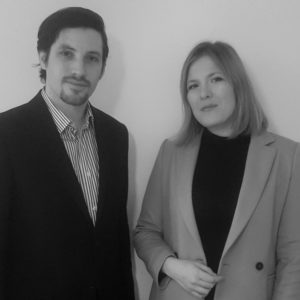

Sébastien Lachaussée & Elisa Martin-Winkel
Coproducing between France and Middle East Countries
The release in October 2018 of Nadine Labaki’ s new film, « Capharnaüm » enhanced once again the co-production partnerships between France and Middle East countries. Previously in 2016, such partnerships have been embodied by « Je danserai si je veux » of Maysaloun Hamoud coproduced between France, Israël and Palestine.
Whether with Lebanon or Israel, the co-production relationships are long-lasting, and although moderate, the number of co-productions is stable. There is a French-Lebanese majority co-production per year in the last 3 years, 2 between France and Israel in 2017. Mostly, there were up to four French-Israeli majority co-productions in 2012 and 2013 and this Israel ranks in the top 8 majority co-productions since 2012.
These relations are based in particular on international co-production agreements between France and the Middle East countries but also on national or local financing solutions.
FRENCH-LEBANESE AND FRENCH-ISRAELI CO-PRODUCTION AGREEMENTS
France entered co-production agreements with Lebanon and Israel, respectively in 2000 and 2002.
The French-Lebanese co-production agreement implements flexible measures and the proportions contributed by the respective producers from both States can vary from 10 % to 90 %. Nonetheless, the minority co-producer’s contribution shall involve an effective technical and/or artistic participation that is equal to no less than 20% of the total budget.
A general balance must be sought both as regards artistic means. As rather usual, a general balance must be sought both as regards artistic means and the use of the technical resources of the two countries,
On the other hand, the French-Israeli co-production agreement establishes that the proportions contributed by the respective co-producer(s) from each Party shall be between 20 % and 80 % (of the film’s final cost per co-production film, with a possibility to reduce the threshold at 10% subject to the consent of the authorities of both countries. It is stricly provided that the technical and artistic contribution of the co-producer(s) of each Party shall be made in the same proportion as its financial investment, save in the event of an exemption granted by the competent authorities of both Parties in exceptional circumstances.
The films produced under these co-production agreements have the status of national film in both countries and as a consequence can benefit from the aids and funds reserved for national films in each country.
NATIONAL AND LOCAL SUPPORTS
The Isreal Film Fund support is given to full length Israeli films of no less than 80 minutes long and intended primarily for a theatrical release, including Films coproduced under co-production treaties.
The Fund can invest up to 70% of the « below the line » budget as approved and financial support can range from $ 50,000 to $ 600,000.
At the local level, international producers can also turn to the Jerusalem Film and Television Fund which offers a specific tax credit, which corresponds to a 60% refund of the budget spent in Jerusalem up to 10,000,000 shekels (approx. 2.4M €).
The conditions are rather strict and in particular the production budget in Israel must at least reach 8 million shekels (not far from 2 million euros), being understood that the budget for Jerusalem must represent at least 25% of the total production budget in Israel and not be less than 2 million shekels (about € 480K). Moreover, Jerusalem must be central in the film and accordingly at least 50% of the shooting days planned in Israel shall take place in Jerusalem. It is finally understood that at least 80% of the production budget must be secure and come from abroad.
Available support offers in Lebanon are really limited. Indeed, the Lebanese Ministry of Culture’s support for film production has a modest budget of $ 80,000 per year. Support for a project ranges from $ 5,000 to $ 8,000. Furthermore, it is subject to strong competition because it covers writing and development, production but also marketing and all cinematographic activities.
This reality necessarily leads to resort to private funds, associations or festivals.
PRIVATE FUNDS, ASSOCIATIONS AND FESTIVALS
Arab films or with an Arab director can seek the support of the AFAC (arab fund for art and culture). Located in Lebanon, AFAC is dedicated to promoting culture in Arab countries and offers a variety of funds. Support for cinema is open to many projects (short, medium and feature films, animation projects and experimental films) during their development and writing, their production or post-production. The amounts allocated for development can go up to $10 000 US and those for production and post-production can reach $ 50 000.
DOHA Film Institute, a Qatari Fund, also offers supports dedicated to film production. Financings for development, production and post-production are available for first and second Qatari filmmakers and more generally in the Middle East North Africa region for feature film projects. Post-production support is also open to international filmmakers. For feature films, the maximum amount of support ranges from $ 20,000 maximum for development to $ 100,000 maximum for production. Post-production support can reach $ 75,000.
It is to be noted that, in favor of French co-producer, during the first step of a project submission the documents may be submitted in French. Among the films recently supported it is possible to evoke « La belle et la meute » of Kaouther Ben Ania (coproduced notably with France and Lebanon) or « Abu Leila » of Amin Sidi-Boumediene (in production between the Algeria, Belgium, France and Qatar).
In Lebanon, we can also evoke the initiative of the Screen Institute Beirut, which supports the production of feature-length documentaries. It supports some fifteen projects per year up to a limit of $ 15,000 per project.
Finally, SANAD within the Abu Dhabi Film Festival and ENJAAZ within the Dubai International Film Festival (DIFF) both offer aids. SANAD offers filmmakers in the Middle East and North Africa region support for development (up to $ 20,000 per project) or production of feature-length fiction and documentary films (up to $ 60,000 per project). ENJAAZ provides financial support for the post-production of films directed by Arab filmmakers, with a substantial average support of US $ 100,000. The fund is active and has supported more than 130 films since its creation in 2009.
In view of the above, it appears that collaborations between France and Middle East producers offer various possibilities for financing and can be considered in the context of the development and production of films. Within such international collaborations, it is essential to ensure that the relationships between producers and their partners are effectively framed both for development, production and distribution of the films. To do so and in order to meet the needs of the producers, it is strongly advised to resort to a specialized legal counsel.
SHARE THIS ARTICLE
CONTACT
OUR OFFICES
INFORMATION
sl@avocatl.com
PHONE
+33.1.83.92.11.67
Address
121, boulevard de Sebastopol
75002 Paris
5th floor / Staircase A
Follow us :
Newsletter
Please enter your e-mail :
